In the previous post, I presented a basic system for runtime reflection in C++11. The post included a sample project that created a type descriptor using a block of macros:
// Define Node's type descriptor
REFLECT_STRUCT_BEGIN(Node)
REFLECT_STRUCT_MEMBER(key)
REFLECT_STRUCT_MEMBER(value)
REFLECT_STRUCT_MEMBER(children)
REFLECT_STRUCT_END()
At runtime, the type descriptor was found by calling reflect::TypeResolver<Node>::get().
This reflection system is small but very flexible. In this post, I’ll extend it to support additional built-in types. You can clone the project from GitHub to follow along. At the end, I’ll discuss other ways to extend the system.
Adding Support for double
In Main.cpp, let’s change the definition of Node so that it contains a double instead of an int:
struct Node { std::string key; double value; std::vector<Node> children; REFLECT() // Enable reflection for this type };
Now, when we build the sample project, we get a link error:
error: unresolved external symbol "reflect::getPrimitiveDescriptor<double>()"
That’s because the reflection system doesn’t support double yet. To add support, add the following code near the bottom of Primitives.cpp, inside the reflect namespace. The highlighted line defines the missing function that the linker complained about.
//-------------------------------------------------------- // A type descriptor for double //-------------------------------------------------------- struct TypeDescriptor_Double : TypeDescriptor { TypeDescriptor_Double() : TypeDescriptor{"double", sizeof(double)} { } virtual void dump(const void* obj, int /* unused */) const override { std::cout << "double{" << *(const double*) obj << "}"; } }; template <> TypeDescriptor* getPrimitiveDescriptor<double>() { static TypeDescriptor_Double typeDesc; return &typeDesc; }
Now, when we run the program – which creates a Node object and dumps it to the console – we get the following output instead. As expected, members that were previously int are now double.
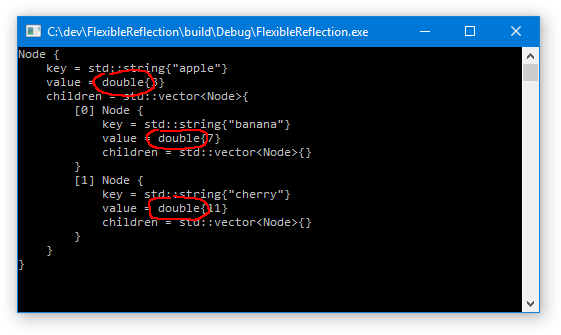
How It Works
In this system, the type descriptor of every primitive “built-in” type – whether it’s int, double, std::string or something else – is found using the getPrimitiveDescriptor<>() function template, declared in Reflect.h:
// Declare the function template that handles primitive types such as int, std::string, etc.: template <typename T> TypeDescriptor* getPrimitiveDescriptor();
That’s the primary template. The primary template is not defined anywhere – only declared. When Main.cpp compiles, the compiler happily generates a call to getPrimitiveDescriptor<double>() without knowing its definition – just like it would for any other external function. Of course, the linker expects to find the definition of this function at link time. In the above example, the function is defined in Primitives.cpp.
The nice thing about this approach is that getPrimitiveDescriptor<>() can be specialized for any C++ type, and those specializations can be placed in any .cpp file in the program. (They don’t all have to go in Primitives.cpp!) For example, in my custom game engine, the graphics library specializes it for VertexBuffer, a class that manages OpenGL vertex buffer objects. As far as the reflection system is concerned, VertexBuffer is a built-in type. It can be used as a member of any class/struct, and reflected just like any other member that class/struct.
Be aware, however, that when you specialize this template in an arbitrary .cpp file, there are rules that limit the things you’re allowed to do in the same .cpp file – though the compiler may or may not complain.
Adding Support for std::unique_ptr<>
Let’s change the definition of Node again so that it contains a std::unique_ptr<> instead of a std::vector<>.
struct Node { std::string key; double value; std::unique_ptr<Node> next; REFLECT() // Enable reflection for this type };
This time, we’ll have to initialize the Node object differently:
// Create an object of type Node Node node = { "apple", 5, std::unique_ptr<Node>{new Node{ "banana", 7, std::unique_ptr<Node>{new Node{ "cherry", 11, nullptr }} }} };
The block of macros needs to be updated, too:
// Define Node's type descriptor REFLECT_STRUCT_BEGIN(Node) REFLECT_STRUCT_MEMBER(key) REFLECT_STRUCT_MEMBER(value) REFLECT_STRUCT_MEMBER(next) REFLECT_STRUCT_END()
If we build the sample project at this point, we’ll encounter a link error, as before.
error: unresolved external symbol "reflect::getPrimitiveDescriptor<std::unique_ptr<Node>>()"
That’s because the system doesn’t support std::unique_ptr<> yet – no surprise there. We want the system to consider std::unique_ptr<> a built-in type. Unlike double, however, std::unique_ptr<> is not a primitive type; it’s a template type. In this example, we’ve instantiated std::unique_ptr<> for Node, but it could be instantiated for an unlimited number of other types. Each instantiation should have its own type descriptor.
The system looks for std::unique_ptr<Node>’s type descriptor the same way it looks for every type descriptor: through the TypeResolver<> class template. By default, TypeResolver<>::get() tries to call getPrimitiveDescriptor<>(). We’ll override that behavior by writing a partial specialization instead:
// Partially specialize TypeResolver<> for std::unique_ptr<>: template <typename T> class TypeResolver<std::unique_ptr<T>> { public: static TypeDescriptor* get() { static TypeDescriptor_StdUniquePtr typeDesc{(T*) nullptr}; return &typeDesc; } };
In this partial specialization, get() constructs a new kind of type descriptor: TypeDescriptor_StdUniquePtr. Whenever the system looks for a type descriptor for std::unique_ptr<T> – for some type T – the compiler will instantiate a copy of the above get(). Each copy of get() will return a different type descriptor for each T, but the same type descriptor will always be returned for the same T, which is exactly what we want.
I’ve implemented full support for std::unique_ptr<> in a separate branch on GitHub. The partial specialization is located in Reflect.h so that it’s visible from every source file that needs it. With proper support in place, the sample project successfully dumps our updated Node object to the console.
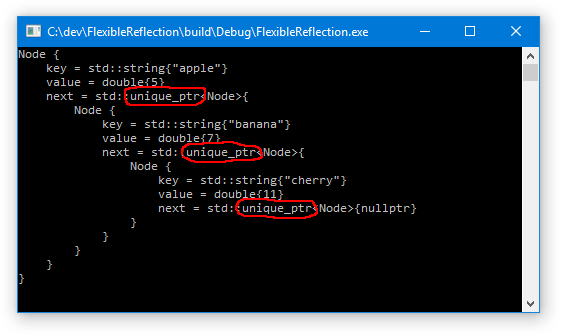
How It Works
In memory, the type descriptor for std::unique_ptr<Node> looks like this. It’s an object of type TypeDescriptor_StdUniquePtr, a subclass of TypeDescriptor that holds two extra member variables:
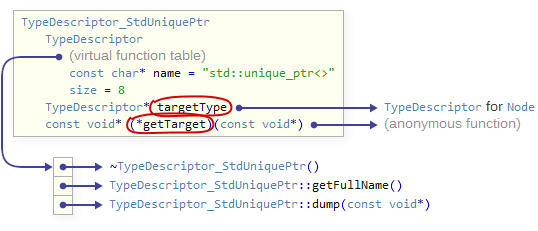
Of those two member variables, the more mysterious one is getTarget. getTarget is a pointer to a kind of helper function. It points to an anonymous function that, at runtime, will dereference a particular specialization of std::unique_ptr<>. To understand it better, let’s see how it gets initialized.
Here’s the constructor for TypeDescriptor_StdUniquePtr. It’s actually a template constructor, which means that the compiler will instantiate a new copy of this constructor each time it’s called with a different template parameter (specified via the dummy argument). It’s called from the partial specialization of TypeDescriptor we saw earlier.
struct TypeDescriptor_StdUniquePtr : TypeDescriptor { TypeDescriptor* targetType; const void* (*getTarget)(const void*); // Template constructor: template <typename TargetType> TypeDescriptor_StdUniquePtr(TargetType* /* dummy argument */) : TypeDescriptor{"std::unique_ptr<>", sizeof(std::unique_ptr<TargetType>)}, targetType{TypeResolver<TargetType>::get()} { getTarget = [](const void* uniquePtrPtr) -> const void* { const auto& uniquePtr = *(const std::unique_ptr<TargetType>*) uniquePtrPtr; return uniquePtr.get(); }; } ...
Things get a little complex here, but as you can hopefully see, getTarget is initialized to a (captureless) lambda expression. Basically, getTarget points to an anonymous function that casts its argument to a std::unique_ptr<> of the expected type, then dereferences it using std::unique_ptr<>::get(). The anonymous function takes a const void* argument because the struct TypeDescriptor_StdUniquePtr can be used to describe any specialization of std::unique_ptr<>. The function itself knows which specialization to expect.
Moreover, because the lambda expression is evaluated inside a template constructor, the compiler will generate a different anonymous function for each specialization of std::unique_ptr<>. That’s important, because we don’t know how std::unique_ptr<> is implemented by the standard library. All we can do is generate these anonymous functions to help us deal with every possible specialization.
With all of that in place, the implementation of TypeDescriptor_StdUniquePtr::dump(), which helps dump the object to the console, is much more straightforward. You can view the implementation here. It’s written in a generic way: The same function is used by all std::unique_ptr<> type descriptors, using getTarget to handle the differences between specializations.
Incidentally, TypeDescriptor_StdVector is implemented in much the same way as TypeDescriptor_StdUniquePtr. The main difference is that, instead of having one anonymous helper function, TypeDesriptor_StdVector has two: one that returns the number of elements in a std::vector<>, and another that returns a pointer to a specific element. You can see how both helper functions are initialized here.
Summary of How Type Descriptors are Found
As we’ve seen, a call to reflect::TypeResolver<T>::get() will return a type descriptor for any reflected type T, whether it’s a built-in primitive type, a built-in template type, or a user-defined class or struct. In summary, the compiler resolves the call as follows:
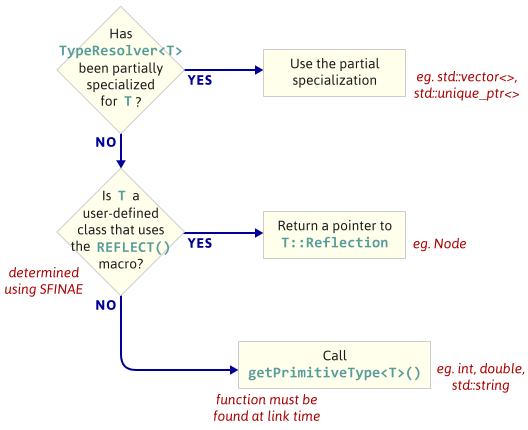
Further Improvements
In the FlexibleReflection sample project, type descriptors are useful because they implement virtual functions like getFullName() and dump(). In my real reflection system, however, type descriptors are mainly used to serialize to (and from) a custom binary format. Instead of virtual functions, the serialization API is exposed through a pointer to an explicit table of function pointers. I call this table the TypeKey. For example, the real TypeDescriptor_Struct looks something like this:
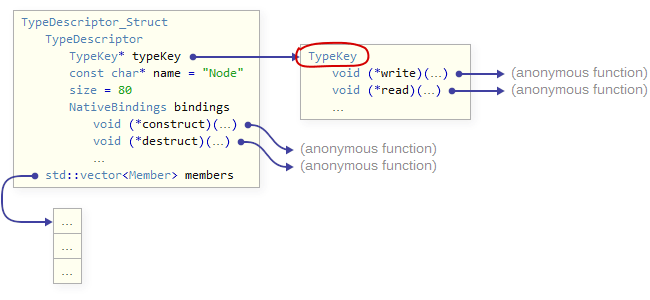
One benefit of the TypeKey object is that its address serves as an identifier for the kind of type descriptor it is. There’s no need to define a separate enum. For example, all TypeDescriptor_Struct objects point to the same TypeKey.
You can also see that the type descriptor has function pointers to help construct and destruct objects of the underlying type. These functions, too, are generated by lambda expressions inside a function template. The serializer uses them to create new objects at load time. You can even add helper functions to manipulate dynamic arrays and maps.
Perhaps the biggest weakness of this reflection system is that it relies on preprocessor macros. In particular, a block of REFLECT_STRUCT_*() macros is needed to reflect the member variables of a class, and it’s easy to forget to keep this block of macros up-to-date. To prevent such mistakes, you could collect a list of class members automatically using libclang, a custom header file parser (like Unreal), or a data definition language (like Qt moc). For my part, I’m using a simple approach: A small Python script reads class and member names from clearly-marked sections in each header file, then injects the corresponding REFLECT_STRUCT_*() macros into the corresponding .cpp files. It took a single day to write this script, and it runs in a fraction of a second.
I developed this reflection system for a custom game engine I’m working on, all to create a little game called Hop Out. The reflection system has proven invaluable so far. It’s used heavily in both my serializer and 3D renderer, and it’s currently reflecting 134 classes that are constantly in flux, with more being added all the time. I doubt I could manage all that data without this system!
 Preshing on Programming
Preshing on Programming